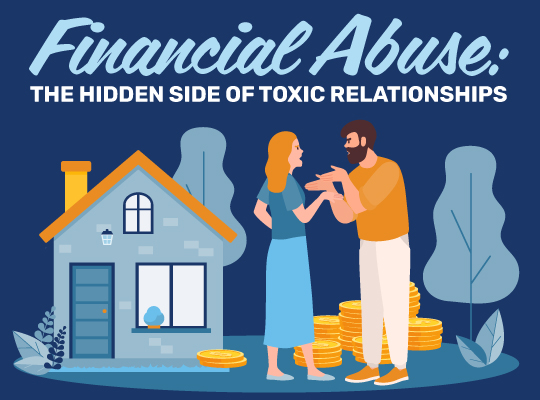Financial Abuse: The Hidden Side of Toxic Relationships
When we think about abuse, typically our minds jump to physical or mental abuse. But there is another form. One that is quieter, and often less visible, but can trap someone just as deeply: financial abuse.
In our 20th Episode of Making Sense of Money, we sat down with Shelly Meisner from the YWCA. Shelly is an advocate with over 20 years of experience supporting survivors of abuse. She shared her insights into how financial control operates in toxic relationships and what resources are available for those who find themselves trapped in such situations.

What is Financial Abuse?
At its core, financial abuse is about control. It's a pattern of behavior where one partner limits the other's access to money, employment, or financial decision-making. Shelly explained, "When you don't have access to money, you don't have access to options. And that lack of freedom is exactly how control is maintained."
Common signs of financial abuse include:
- Not allowed access to shared bank accounts
- One partner manages all the finances and makes all the decisions
- Preventing employment or sabotaging work opportunities
- Racking up debt in a partner's name
- Using money as leverage: "If you don't do this, you won't get money for food, bills, or the kids."
Early Warning Signs to Look For
Often, financial abuse begins after emotional or psychological manipulation is already happening. Some red flags include:
- When a relationship escalates too quickly, especially when combining finances
- One partner insists on controlling all spending
- Sudden or unexplained debt
- Being discouraged from working, going to school, or learning about money
How Financial Abuse Traps People
Financial abuse often isolates survivors, both economically and emotionally. "It's not uncommon for someone to find out a line of credit or a loan was opened in their name without their knowledge." Shelly says, "later, they're financially liable for something they never agreed to, and that kind of sabotage can take years to recover from." Shelly shared that some survivors were not even aware of loans or credit cards in their name until they were stuck with the aftermath.
Rebuilding: Where to Turn for Help
Financial recovery after abuse isn't quick, but it's possible. It can take survivors up to two years to rebuild their financial lives. Knowing what is on your credit report can be a powerful first step. You can access a copy of your credit report at www.annualcreditreport.com to see all the accounts that are tied to your credit history.
What You Can Do to Support Others
If someone you know is struggling financially or seems isolated in their relationship, your support matters. Abuse thrives in silence. As Shelly put it, "the one thing that allows abuse to grow is isolation. When you are able to talk with somebody, you break that silence, and that silence is what keeps it all together." You don't need to have all the answers, sometimes, just showing up, listening, and offering help can be life-changing. Remember, financial knowledge is more than just about budgeting, it's about empowerment, choice and freedom.
If you or someone you know is experiencing financial abuse, help is available. You can reach out to your local YWCA for resources and support. For more financial tips, listen to our podcast Making Sense of Money and check out past issues of Basecamp.

